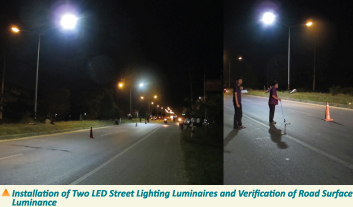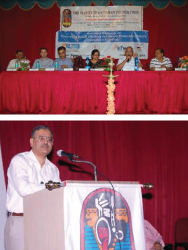| |
 |
 |
| Newsletter of the International Institute for Energy Conservation (IIEC) |
June 2011 |
|
| |
| |
|
| |
|
IIEC Supports ADB in an Innovative Project on Energy Efficiency in Municipalities
 IIEC is the lead consultant for an Asian Development Bank (ADB) and Thailand’s Provincial Electricity Authority (PEA) project on Mainstreaming Energy Efficiency in Municipalities in Thailand. The objective of the first phase of this IIEC is the lead consultant for an Asian Development Bank (ADB) and Thailand’s Provincial Electricity Authority (PEA) project on Mainstreaming Energy Efficiency in Municipalities in Thailand. The objective of the first phase of this |
two-year project is to identify standard energy efficiency measures applicable to buildings
and street lighting in selected municipalities and develop a sustainable business model(s) for large scale
implementation incorporating private sector financing models and the Clean Development Mechanism (CDM).
Under this project, the IIEC is tasked to support ADB and PEA in:
1. The demonstration of the benefits of energy efficiency projects implemented through customized financing
arrangements in the 6 pilot municipalities, i.e. Lumphun, Nongkhai, Udonthani, Banpong, Krabi and Trang.
2. Finalizing a plan for large scale replication nation-wide complimented by enhancing the capacity of PEA and
municipalities in energy efficiency project development and implementation.
3. A communication and outreach program covering all sectors of the community. |
Point 1 above is currently being
implemented by IIEC with a pioneering
municipal energy efficiency
demonstration project in Trang
Municipality, including the installation
and operation of Light-Emitting Diodes
(LEDs) street lighting.It will be the first-
ever LED street lighting demonstration
project in Thailand and will be
implemented in all six municipalities
with a total of 100 LED roadway
luminaires to be installed.
LED technology is considered the next
generation of high-efficient lighting as it uses about half as much energy as conventional sodium streetlights, and |
 |
|
| typically lasts for up to 50,000 hours
(almost 6 years of continuous use) instead of 10,000 to 30,000 hours lifetime for the conventional technologies for street lighting applications. |
| |
|
|
| |
|
Addressing the Power Crisis in Malawi
 IIEC has been engaged by the UK Department for International Development (DFID) for the design and IIEC has been engaged by the UK Department for International Development (DFID) for the design and
implementation of a nationwide Energy Efficient Lighting Program (EELP) in Malawi. This is the first large
scale |
Demand-side Management (DSM) program to be undertaken in Malawi and is aimed at addressing the
current acute power shortage (around 14%) during the evening peak period. The program entails the
procurement of high quality Compact Fluorescent Lamps (CFLs) and direct installation (replacing incandescent
bulbs) in the residential, small enterprises and public sector. Electrical retailers will support the program through
the sale of CFLs to the private sector at subsidised prices. The program is expected to reduce around 50 MW in
peak demand.
To ensure sustainability the program also includes the development of an incandescent bulb phase-out policy,
minimum energy performance standards for CFLs and safe disposal guidelines for fluorescent lighting. |
|
|
|
| |
|
Promoting Energy Efficiency and Cleaner Production Measures in Indian MSMEs
 In the framework of the Financial Cooperation between India and Germany, the German Development Bank
(KfW) In the framework of the Financial Cooperation between India and Germany, the German Development Bank
(KfW)
is providing an energy efficiency (EE) and a cleaner production (CP) credit line to the Small Industries
Development |
| Bank of India (SIDBI). The credit lines (worth EUR 88.5 million) are targeted for investment loans for
EE and CP measures in existing micro, small, and medium industrial enterprises (MSME) in India. The consulting
consortium of Adelphi Consult (Adelphi), International Institute for Energy Conservation (IIEC) and Triodos Facet
Consulting (Triodos) has been contracted by SIDBI to provide Technical Assistance to both the credit lines. The
technical assistance project aims at assisting SIDBI and potential clients of the credit lines to identify, plan,
evaluate and implement investments eligible under the two credit lines. |
In this context, the consultants have shortlisted 18 clusters in India to
organize awareness workshops and promote credit lines. The first
workshop in the series was organized in Belgaum Foundry Cluster (BFC),
Karnataka on 15 March 2011 in association with SIDBI and Institute of
Indian Foundrymen (IIF) – Belgaum chapter. The Workshop was attended
by about 100 participants including promoters of MSMEs in the Belgaum
area, energy auditors and other stakeholders involved in promotion of EE
and CP in MSMEs.
Mr. Shishir Athale, EE specialist from IIEC spoke about specific EE measures
and technologies applicable for Belgaum foundries by discussing particular
case studies. He recommended that melting process being the major
consumer of fuel in foundries (~60%), adoption of EE practices and simple
operating practices especially in the areas of moulding, gating and
methoding, pouring will increase throughput and save on energy costs. |
 |
|
| For further information, please contact Anil Kumar - akumar@iiec.org |
Back to Top  |
|
|
|
| |
|
IIEC provides Insight on ESCO and Energy Leasing Market in Thailand
 The International Finance Corporation (IFC) has assigned IIEC to conduct a comprehensive market Survey on The International Finance Corporation (IFC) has assigned IIEC to conduct a comprehensive market Survey on
Sustainable Energy Leasing and ESCO Business Opportunities in Thailand. The aim of this project is to
identify |
| business opportunities in lease financing combined with Energy Service Companies (ESCOs), Energy
Efficiency (EE), Renewable Energy (RE) and Cleaner Production (CP) services and also other energy financing
options in Thailand. |
On the 19th of May 2011, the IIEC successfully
organized a workshop in Bangkok attended by 60
delegates from the commercial banking and
leasing sectors, ESCOs, equipment suppliers,
utilities and government stakeholders in Thailand
(see photograph on the right). The objective was to
present and discuss the interim findings of the
survey and gather critical feedback from the
audience. Comments and suggestions from the
workshop will be incorporated into the final
recommendations to be presented to the
stakeholders in early June 2011.The IIEC project team has carried out a survey and
assessment of the existing regulatory, legal and
fiscal frameworks, market drivers and barriers, market potential for energy efficiency and renewable energy. |
 |
|
| The final project output is to provide recommendations for IFC on potential mechanisms that could enable the uptake of energy lease and ESCO business in EE/RE/CP in Thailand. |
|
|
|
| |
|
About IIEC
 The International Institute for Energy Conservation (IIEC) was established in 1984 as a non-governmental (NGO), The International Institute for Energy Conservation (IIEC) was established in 1984 as a non-governmental (NGO),
not-forprofit organization, in order to foster the implementation of energy efficiency in developing countries and
countries in transition. IIEC’s mission is to accelerate the global adoption of energy efficiency, transport and |
environmental policies, technologies and best practices to enable sustainable economic and environmental development.
For the past 25 years, IIEC has been providing solutions to the problems posed by the rapid increase of energy
demand in developing and industrializing countries. IIEC has an established niche as a provider of novel
solutions with the flexibility to work simultaneously with multilateral institutions, governments, academic and
research institutes, industry and non-governmental organizations. |
|
|
 If you do not wish to receive IIEC E-Notes, please reply to e-notes@iiec.org with the word "UNSUBSCRIBE" in the subject line. If you do not wish to receive IIEC E-Notes, please reply to e-notes@iiec.org with the word "UNSUBSCRIBE" in the subject line. |
| |
 |
Partners for Sustainable Energy and Environmental Solutions |
|
|
 |
| Head Office : |
 |
Asia Regional Office : |
Country Offices : |
|
USA
Tel: +1 703 281 7263
Fax: +1 703 938 5153
e-mail: iiecdc@iiec.org |
Thailand
Tel: +66 2 662 3460-5
Fax: +66 2 261 8615
e-mail: iiecbangkok@iiec.org |
India
Tel: +91 20 6410 2557-58
e-mail: iiecindia@iiec.org |
Philippines
Tel: +632 426 8567/426 6001 loc 4833
Fax: +632 426 8566
e-mail: iiecmanila@iiec.org |
|
 |
| Copyright © 2011 International Institute for Energy Conservation, All Rights Reserved. |
|
